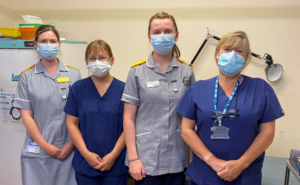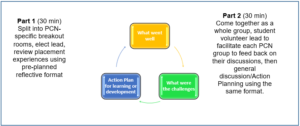Background
In 2018, Health Education England South West (HEESW) in partnership with the University of Plymouth (UoP) introduced a project to support Collaborative Learning in Practice (CLiP) for student nurses within the community. Two care homes, two hospices and two GP practices in two counties in the Southwest participated in the pilot and provided 25 students with the opportunity of a different placement experience. The key positive themes from the project, were strong peer support in shared learning, rapid development of clinical decision making and leadership skills, echoing research undertaken in this area. At the end of the Project the two GP practices continued with CLiP, whereas for various reasons the other participants did not.
It seemed a natural step to build on this successful pilot, through linking with the configuration of GP Practices into Primary Care Networks (PCNs) where there is an opportunity for sustainable student placements using the CLiP model. The aim was to enhance placement learning within the philosophy of CLiP using the PCN as a ‘hub’ – students working and learning together supported through coaching in clinical practice, with opportunities for inter-professional learning with other healthcare students in the hubs under the CLiP umbrella.
 The HEESW Project team in partnership with seven PCNs, three HEIs within the SW region launched CLiP within the PCN model during the Summer of 2021. This complimented and integrated with the HEE South West Clinical Placement Expansion Programmes (CPEP) through increasing primary care placement capacity within the PCNs by 50% and thus increasing potential for recruitment into primary care roles.
The HEESW Project team in partnership with seven PCNs, three HEIs within the SW region launched CLiP within the PCN model during the Summer of 2021. This complimented and integrated with the HEE South West Clinical Placement Expansion Programmes (CPEP) through increasing primary care placement capacity within the PCNs by 50% and thus increasing potential for recruitment into primary care roles.
CLiP requires a change in the culture in which student learning is facilitated within a placement, and lessons learnt from the first project influenced refinements for the PCN pilot.
Preparation
Pre-Covid-19 preparation took place for those in the practice setting and for students in the universities. Social distancing offered the opportunity for virtual workshops via MS Teams® for all participating practices, which had the potential for constructing a community of practice across the participating surgeries. Virtual workshops increased attendance. An eLearning mini-module was created, allowing staff and students flexibility on planning their preparation around other commitments.
Figure 1: Placement Preparation Process

The Model
- Initially students sat in with the General Practice Nurses (GPNs) in consultations/clinics, to observe and take notes, until assessed as competent to progress.
- Student led clinics were then added to the appointment system after 2-3 weeks
- Double the usual appointment time was allocated to ensure safe and evidence-based care.
- One GPN indirectly supervised two student clinics and made themselves available to answer queries or to provide advice and guidance for patients presenting with more serious problems. In addition, they would check the patient notes written by the students and supported their learning.
- The students worked autonomously but then shared their experiences with their CLiP peers. This debriefing session allows time to follow up on anything that has interested or challenged them.
- University Practice Support team for students at weekly meetings – and staff support as required.
- There was an opportunity to rotate between the practices within the PCNs.
- Students were facilitated in undertaking group projects such as an audit of dressings and management of Chronic Kidney disorders.
Creating a Community of Practice across the SW Peninsula using MS Teams®
- Weekly meeting, normally one hour long, allows time away from interruptions to identify learning and development that has taken place – and identify action plans for further development with peers.
- The concept is for meetings to be student-led – sometimes facilitated by a member of staff or the University Support Team. Meeting notes are shared with students and clinical staff within the PCN.
Figure 2: Weekly Meeting Reflective Model

Student Feedback
“This CLiP placement has been absolutely fantastic, giving us plenty of opportunities to enable us to achieve our proficiencies and spend time together discussing and sharing what we wanted to achieve”.
“I feel this placement is superb for student nurses whether they are in their first, second or third year. There are plenty of learning opportunities; with valuable and relevant support provided”.
“The CLiP approach on this placement worked extremely well – the four students each had their own clinics, but were encouraged to support each other through the clinics and in the other mini projects we were set during the placement”.
“This was an amazing placement and I learnt and developed so many skills. I am now considering practice nursing as an area that I would like to go into after qualifying”.
“I cannot praise this placement enough. Their kindness, attitude towards giving me a fantastic placement was outstanding; I would thoroughly recommend this experience for students”.
Outcomes and Evaluation
All participating PCNs decided to continue with CLiP placements following the pilot.
- Staff and students felt prepared for CLiP – more so than in previous pilots of CLiP in primary care settings. This resulted in a 50% increase in student placement capacity.
- Students’ capabilities, and confidence in their approach to patient care, leadership and team working was noted to be more advanced and ‘mature’ than students within traditional placement settings.
- High Level of increased placement satisfaction for staff and students.
- Students exhibited an increased interested in Primary care employment following the placement. 75% expressed an interest in Primary Care as a career; two have confirmed jobs in Primary Care on qualification.
- Opportunities for shared learning with students from other professions were informal but acknowledged they could be developed.
To undertake this project during a global pandemic was a difficult decision, particularly as it introduced a change to established culture and practice at an already challenging time. Whilst fewer PCNs participated than we originally hoped, those who did fully engaged with the project, along with the students placed with them. Thus, the project illustrated that despite the huge impact of the pandemic on primary care, General Practice Nurses are still keen and willing to embrace change.
The project is considered as highly successful and very few issues were presented. The potential to create a community of practice between students and PCN staff is currently being researched further and is thought to be easily transferable to provide peer support and learning for any learner within a PCN/remote care setting. The intended expansion into two further regions in the Southwest is currently in progress and we are optimistic of success. We are also discussing multi-professional models of CLiP and peer learning using the weekly meeting format with interested parties.
Adele Kane, RN, RNT, MSc, FHEA. Health Education England Practice Fellow – CLiP, Academic Lead, Placement Development Team – Private Sector, University of Plymouth.
Jane Bunce, Placement Lead, Health Education England South West.
Project Team
Jane Bunce: Placement Lead HEESW
Adele Kane: HEE Practice Fellow, University of Plymouth
Sharon Evans: Strategic lead nurse for general practice nursing, NHS Kernow Clinical Commissioning Group
Andy Cunningham: PVI PDT University of Plymouth
Emma Thoms: BSc Adult Nursing Programme Lead (Devon) University of Bolton
For more information, please see HEE SW CLiP Libguide.
Contact adele.kane@plymouth.ac.uk or jane.bunce@hee.nhs.uk.
Author Biographies
Adele Kane, MSc Health and Social Care Education, RN, RNT, HEE Fellow
Adele Kane is Academic Lead with the Placement Development Team – Private Sector, with the University of Plymouth and has been working as a Health Education England (HEE) Practice Fellow supporting Collaborative Learning in Practice (CLiP™) developments. She has been programme Lead and Subject Specialist in Mentorship and Return to Practice for Nursing and Midwifery, Chair of the southwest PRECEPTORSHIP Network and has led projects in E-Learning development. Through her roles with the University and HEE she has actively supported the implementation of CLiP Projects across acute and community hospital care settings for Adult, Mental Health and Midwifery students in the southwest. In addition, in 2019/20 she worked on a joint UoP and HEE project to pilot CliP in hospice, care home and GP settings. More recently she has worked with HEE to implement a pilot of CLiP across Primary Care Networks (PCNs) in the South West.
Jane Bunce, MSc Healthcare Leadership, Placement Lead, Health Education England
Jane Bunce has worked in healthcare education since 2005 and works for Health Education England (HEE) as Placement Lead for the South West. Jane successfully project managed the HEE funded 2019/20 pilot of CLiP in hospice, care home and GP settings, in collaboration with the University of Plymouth (UoP). Most recently, she has been leading the CLiP PCN project on behalf of HEE. Jane has led the development of the CLiP South West Lib Guide site, which includes a range of resources and research articles, and is in the process of setting up a community of practice for the South West.
Jane and Adele have contributed to a number of research articles related to CLiP which are available via the Lib Guide.
Acknowledgements:
Janet Peacock Healthcare Practice Placement Development Lead, for contribution to staff and student support.
Primary Care Network Nursing Teams:
Three Harbours & Bosvena, Cornwall
Beacon Medical and Friary House, Plymouth
Barnstable Alliance, Barnstable
Alison Williams, Nurse Manager. Redgate and Somerset Bridge Medical Centres.
Emma Thoms Senior Lecturer Bolton University
